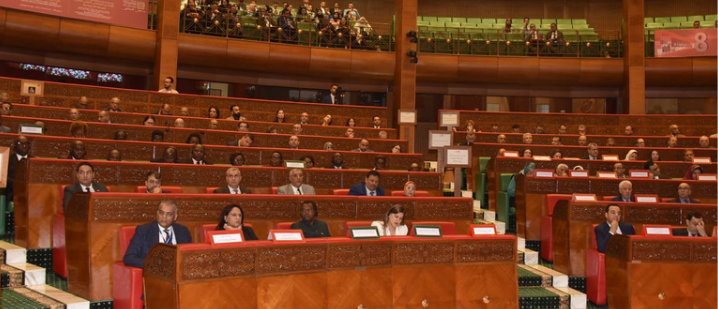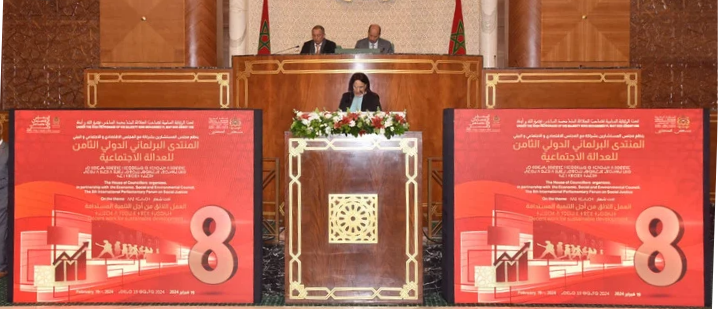8th International Parliamentary Forum on Social Justice: Ms. Bouayach Emphasizes the Significance of Decent Work in Enhancing Human Capital for the Promotion of Social Justice and Preservation of Human Dignity

Ms. Amina Bouayach, Chairperson of the National Human Rights Council (CNDH), participated on Monday 19 February 2024, at the House of Councillors in Rabat, Morocco, in the opening of the 8th International Parliamentary Forum for Social Justice.
Organized by the House of Councillors in partnership with the Economic, Social and Environmental Council (CESE), the meeting brings together members of the government and parliament, heads of several relevant bodies, constitutional institutions and national agencies, representatives of the International Labor Organization (ILO), the Council of Europe (CoE) office in Morocco, the Organization for Economic Cooperation and Development (OECD) and the United Nations Development Program (UNDP) in Morocco, as well as representatives of regional councils, experts and academics.
At the opening session of this Forum, Ms. Bouayach stressed that providing decent employment contributes to enhancing human capital and achieving social justice as a strategic option that requires rearranging the priorities of public authorities to focus on human development and reducing disparities.

CNDH Chairperson added that providing more decent jobs contributes to achieving economic growth that reduces poverty indicators, particularly among vulnerable groups. It also ensures access to social protection and safeguards against discrimination and abuse. She also noted that social protection and decent work are intertwined. Social protection includes safety, unemployment insurance, retirement and health care, protection against financial risks, enhancing appropriate conditions for decent work and ensuring fundamental rights for all working groups. This connection is reflected in any country’s development indicators, she said.
Ms. Bouayach emphasized that the prevalence of informal labor, marked by its vulnerability and restricted income, defines the national labor market. The presence of significant disparities in working hours, wages, and productivity identifies the situation, hindering a diverse range of citizens, particularly women, young individuals, and migrants, from fully exercising their rights to decent employment.

Speaking about development factors, Ms. Bouayach underscored that ensuring the effectiveness of decent work involves incorporating it as a distinct component of development and a fundamental aspect of public policy. This entails establishing legal and social protection to workers' rights, fortifying them, and creating the essential economic and social conditions to combat gender-related discrimination, ultimately striving for social and spatial justice.
She further stated that the economic and social challenge of inadequate working conditions or limited job opportunities affects both women and young individuals. This statement aligns with findings from international human rights reports. The significance of incorporating women and young individuals into economic impetus is linked to their roles in supporting social stability and fostering sustainable development.
The proceedings of this Forum focus on addressing all the questions and issues related to the topic, with a specific emphasis on examining the interdependent relationship between decent work and sustainable development in Morocco. The Forum also addresses two main axes related to the correlation and complementarity between decent work and international and national standards and the challenges of rehabilitation and integration of the economy.
The Forum aims to put forward parliamentary approaches capable of guaranteeing and reinforcing, both qualitatively and quantitatively, decent work, which is one of the foundations for consolidating social justice and enshrining the pillars of the welfare state, in line with the High Royal Guidelines, which emphasize that the creation of productive and dignified employment opportunities is one of the noblest forms of social protection.
The House of Councillors also intends to make this edition a real opportunity to highlight the reality of decent work in the Kingdom and the various issues it raises, in particular the contribution of decent work to achieving the objectives of the National Strategy for Sustainable Development, as defined by the National Charter for the Environment and Sustainable Development.






















